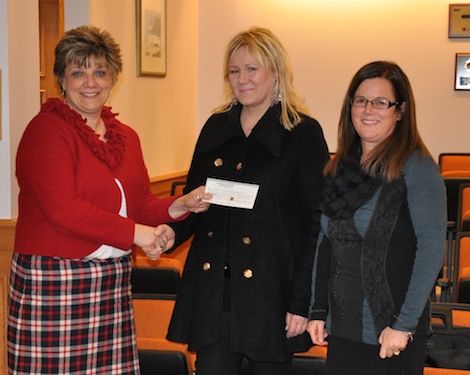
NEWS RELEASE
ALGOMA DISTRICT SCHOOL BOARD
*************************
Algoma District School Board Breakfast Programs: Donation & Overview
Saija Paakki, President of the Sault Insurance Brokers Association (SIRA) was on hand at Tuesday night’s Board meeting to make a significant financial contribution to Algoma District School Board’s (ADSB) Breakfast Programs.
The cheque, in the amount of $2,000 will go a long way to help ADSB schools offer healthy breakfast items throughout the district.
This is the sixth year that SIRA has made this donation to the Board, and Director Reece thanked the Association for its on-going support.
Superintendent Brenda O’Neill went on to provide an update on the Board’s nutrition programs.
Currently we have 46 Nutrition Programs being offered in our schools.
Many of our schools (34) offer either a breakfast program or a morning meal.
Many of our schools are part of the Northern Ontario Fruit and Vegetable program established by the Ministry of Health and Long Term Care (MHLTC).
Through this program approximately 12,000 children in 60 elementary schools in the Porcupine and Algoma District are receiving two servings of fruit and vegetables each week.
Private donations, like the one from SIRA are so important for the on-going success of nutrition programs.
Funding throughout the district comes from other sources including Algoma Family Services (who fund the Student Nutrition Program) and Algoma Public Health who coordinate the MHLTC Fruit and Vegetable program.
Schools always ensure that food is available or distributed in ways to ensure no students feel stigmatized.
Many schools have exceptional assistance from parent/grandparent volunteers, school councils, student helpers and staff volunteers.
These individuals are often the ones either doing the shopping for food or picking up, unpacking, sorting, storing and delivering the food on any given day.
Overview of Visible Learning Conference
A group of ADSB administrators attended the Visible Learning Conference held in Toronto in early February.
Superintendent Brenda O’Neill introduced Principals Debbie Kent and Brenda Butler-McTaggart who provided Trustees with an overview of that conference.
It featured the work of Professor John Hattie of the University of Melbourne.
John is the author of the ground-breaking book “Visible Learning,” a book published in 2009 which synthesized the results of more than 15 years’ research involving millions of students and represented the biggest ever collection of evidence-based research into what actually works in schools to improve learning.
Conference attendees focused on topics such as Creating Visible Learners, seeking out student voice and applying the Visible Learning research meta-analysis to classroom practice.
When teachers see learning through the eyes of their students and students see themselves as their own teachers – this is what is meant by Visible Learning.
A major message within the book “Visible Learning” is that what works best for students is similar to what works best for teachers.
This includes an attention to setting challenging learning intentions, being clear about what success means, and an attention to learning strategies for developing conceptual understanding about what teachers and students know and understand.
Michael Fullan, co-author of “A Rich Seam”, said this of the book: “Visible Learning is the definitive book on sorting out the effectiveness of teaching strategies – a must read for those who want to improve teaching and learning.”
The thinking and research behind Visible Learning aligns with and links to “A Rich Seam” and in turn to Algoma District School Board’s new Board Improvement Plan for Student Achievement.
Information about the Visible Learning Conference was shared with Principals at their February meeting to take back to their schools.
Board Improvement Plan for Student Achievement K-12 (2015 – 2018)
At the centre of our Board Improvement Plan for Student Achievement (BIPSA) is the question “How do we ensure continuous improvement in instruction, student achievement and well-being?”
Director Lucia Reece shared her thinking around the BIPSA which will guide the board for the next 4 years.
“Our staff, through on-going collaboration and inquiry, research and professional learning, openly share their practices, their learning, their questions, their challenges, and of course, their successes.
It is through learning together that we, as a system, become stronger and discover new learning and opportunities.
I am excited by the risk-taking and willingness to innovate and experiment with new pedagogies, technologies, and assessment practices.
We know that with courage and perseverance, we will continue to make gains in improving instruction and student achievement, and to make a difference in the lives of our students.
At the district level, we will continue to provide further learning opportunities to support literacy, numeracy and achievement, and remain committed to providing opportunities that support the physical and mental well-being of our learners.
We will continue to rely on research and best practices from educational leaders such as Michael Fullan, John Hattie, Richard Elmore and Ken Leithwood as well as the work from Carol Dweck, to ensure that what we implement is precise and proven to have positive impact.
John Hattie’s compilation of research will continue to guide our work to support the implementation of effective teaching strategies that have a high impact on student learning.
At the heart of our work is a continued focus on formative assessment, particularly feedback.
As Hattie notes in Visible Learning, it is “feedback to the teacher about what students can and cannot do that is more powerful than feedback to the student,” and this requires a different type of teacher-student interaction as well as a classroom climate that welcomes errors as “key levers” to enhance learning.”
The 2015 – 2018 BIPSA will be available on the Board’s website www.adsb.on.ca.
*************************